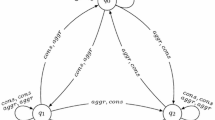Abstract
We study infinite stochastic games played by two-players over a finite state space, with objectives specified by sets of infinite traces. The games are concurrent (players make moves simultaneously and independently), stochastic (the next state is determined by a probability distribution that depends on the current state and chosen moves of the players) and infinite (proceeds for infinite number of rounds). The analysis of concurrent stochastic games can be classified into: quantitative analysis, analyzing the optimum value of the game; and qualitative analysis, analyzing the set of states with optimum value 1. We consider concurrent games with tail objectives, i.e., objectives that are independent of the finite-prefix of traces, and show that the class of tail objectives are strictly richer than the ω-regular objectives. We develop new proof techniques to extend several properties of concurrent games with ω-regular objectives to concurrent games with tail objectives. We prove the positive limit-one property for tail objectives, that states for all concurrent games if the optimum value for a player is positive for a tail objective Φ at some state, then there is a state where the optimum value is 1 for Φ, for the player. We also show that the optimum values of zero-sum (strictly conflicting objectives) games with tail objectives can be related to equilibrium values of nonzero-sum (not strictly conflicting objectives) games with simpler reachability objectives. A consequence of our analysis presents a polynomial time reduction of the quantitative analysis of tail objectives to the qualitative analysis for the sub-class of one-player stochastic games (Markov decision processes).
Preview
Unable to display preview. Download preview PDF.
Similar content being viewed by others
References
Chatterjee, K., de Alfaro, L., Henzinger, T.A.: The complexity of quantitative concurrent parity games. In: SODA 2006, pp. 678–687. ACM-SIAM (2006)
Chatterjee, K., de Alfaro, L., Henzinger, T.A.: Trading memory for randomness. In: QEST 2004. IEEE Computer Society Press, Los Alamitos (2004)
Condon, A.: The complexity of stochastic games. Information and Computation 96(2), 203–224 (1992)
Courcoubetis, C., Yannakakis, M.: The complexity of probabilistic verification. Journal of the ACM 42(4), 857–907 (1995)
de Alfaro, L.: Formal Verification of Probabilistic Systems. PhD thesis, Stanford University (1997)
de Alfaro, L., Henzinger, T.A.: Concurrent omega-regular games. In: LICS 2000, pp. 141–154. IEEE Computer Society Press, Los Alamitos (2000)
de Alfaro, L., Majumdar, R.: Quantitative solution of omega-regular games. In: STOC 2001, pp. 675–683. ACM Press, New York (2001)
Durrett, R.: Probability: Theory and Examples. Duxbury Press (1995)
Filar, J., Vrieze, K.: Competitive Markov Decision Processes. Springer, Heidelberg (1997)
Nash Jr., J.F.: Equilibrium points in n-person games. Proceedings of the National Academny of Sciences USA 36, 48–49 (1950)
Kechris, A.: Classical Descriptive Set Theory. Springer, Heidelberg (1995)
Martin, D.A.: The determinacy of Blackwell games. The Journal of Symbolic Logic 63(4), 1565–1581 (1998)
Owen, G.: Game Theory. Academic Press, London (1995)
Papadimitriou, C.H.: Algorithms, games, and the internet. In: STOC 2001, pp. 749–753. ACM Press, New York (2001)
Shapley, L.S.: Stochastic games. Proc. Nat. Acad. Sci. USA 39, 1095–1100 (1953)
Thomas, W.: On the synthesis of strategies in infinite games. In: Mayr, E.W., Puech, C. (eds.) STACS 1995. LNCS, vol. 900, pp. 1–13. Springer, Heidelberg (1995)
Thomas, W.: Languages, automata, and logic. In: Handbook of Formal Languages. Beyond Words, ch. 7, vol. 3, pp. 389–455. Springer, Heidelberg (1997)
von Neumann, J., Morgenstern, O.: Theory of games and economic behavior. Princeton University Press, Princeton (1947)
Author information
Authors and Affiliations
Editor information
Editors and Affiliations
Rights and permissions
Copyright information
© 2006 Springer-Verlag Berlin Heidelberg
About this paper
Cite this paper
Chatterjee, K. (2006). Concurrent Games with Tail Objectives. In: Ésik, Z. (eds) Computer Science Logic. CSL 2006. Lecture Notes in Computer Science, vol 4207. Springer, Berlin, Heidelberg. https://doi.org/10.1007/11874683_17
Download citation
DOI: https://doi.org/10.1007/11874683_17
Publisher Name: Springer, Berlin, Heidelberg
Print ISBN: 978-3-540-45458-8
Online ISBN: 978-3-540-45459-5
eBook Packages: Computer ScienceComputer Science (R0)




